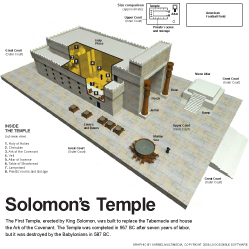28:title–9 This individual lament psalm is a plea for justice. The psalmist opens by petitioning Yahweh to hear his cries (vv. 1–2). He seeks justice, asking Yahweh to punish the wicked and spare him (vv. 3–5). The psalmist then expresses confidence in Yahweh by praising Him for hearing his cry (vv. 6–7). He closes by asking Yahweh to bless and keep all His people safe (vv. 8–9). |
28:title of David See note on 3:title.
28:1 To you Emphasizes that this petition is directed toward Yahweh.
O my rock See note on 27:5. The psalmist describes the security and safety found in Yahweh (compare note on 18:1–3).
I will become like those descending to If Yahweh does not answer him, the psalmist expects to die.
the pit A synonym for the Hebrew concept of she’ol, the realm of the dead (Prov 1:12). See note on Job 14:13.
 Old Testament Theology of the Afterlife
Old Testament Theology of the Afterlife
28:2 I lift up my hands This is a posture of worship (Ps 134:2). The psalmist makes his petition toward the most holy place, the inner sanctuary of the temple (1 Kgs 6:16).
28:3 Do not drag me away Resulting in death (see Ps 28:1 and note). The psalmist does not want to be associated with the wicked and suffer the injustice of being punished with them.
who speak of peace The wicked speak falsely of peace while they plan to harm their neighbors.
28:4 according to their work The psalmist wants to be sure the wicked will be punished.
28:5 they do not regard The term bin means “to understand” or “to consider.” The psalmist requests that the wicked be punished because they do not pay attention to Yahweh’s deeds. They do not understand His attributes, such as righteousness or justice (Prov 2:9).
28:6 my supplications The psalmist praises Yahweh for hearing his petition. Praise is a common element of lament psalms, as the psalmists confidently anticipate Yahweh’s response (see note on Psa 6:8).
28:7 shield A common metaphor for God’s protection.
28:8 his anointed one The Hebrew word used here, mashiach, normally refers to Yahweh’s anointed king (see note on 2:2). Here it represents all of God’s people. The psalmist now focuses on all of Israel rather than himself.
28:9 Shepherd them Emphasizes Yahweh’s care and protection of His people (see note on 23:1).

|
About Faithlife Study BibleFaithlife Study Bible (FSB) is your guide to the ancient world of the Old and New Testaments, with study notes and articles that draw from a wide range of academic research. FSB helps you learn how to think about interpretation methods and issues so that you can gain a deeper understanding of the text. |
| Copyright |
Copyright 2012 Logos Bible Software. |
| Support Info | fsb |
 Loading…
Loading…

